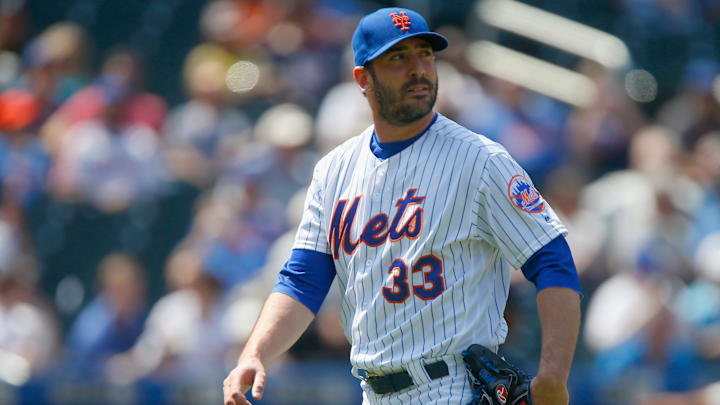Every New York Mets fan has their favorite Matt Harvey memory. For some, it’s his debut and the anticipation of adding a highly-touted pitcher to the Mets’ rotation. For others, it’s the chants of “Har-vey’s bet-ter” in that electric game vs. Stephen Strasbug and the Nationals. Another popular one is the 2015 postseason, in which he dominated and refused to come out of Game 5 of the World Series. In his first three seasons with the Mets, he sported a 2.53 ERA and 146 ERA+, so there were a lot of good times.
Of course, he had his shortcomings as well. He was known as a party-goer, sometimes even the night before his starts. He was routinely late to the ballpark. He would show up to the ballpark disheveled and unprepared. He was suspended for violating team rules. There were so many distractions, despite his prowess on the mound.
I guess my point is this: Matt Harvey’s Mets - and Major League - tenure is full of the highest highs and the lowest lows.
Those that have followed the Eric Kay trial revolving around the tragic death of Angels lefty Tyler Skaggs have seen the headlines by now: Matt Harvey admitted to partying with cocaine, along with taking opioids to stay on the field. While it’s not entirely surprising given his affinity for partying, some of the details are startling.
Harvey says he was a partier. Prosecutor asks, what did you party with? Harvey: "Cocaine."
— T.J. Quinn (@TJQuinnESPN) February 15, 2022
Harvey admitted to snorting cocaine in the clubhouse and dugout. This certainly changes the viewpoint of his two starts in which he had nosebleeds, doesn’t it? At the time, pitching through nosebleeds was considered tough, but now with the new context that has come to light, it should be considered troubling.
More troubling than his reliance on the various drugs was that, according to Harvey, nobody asked him about his usage. Terry Collins, who managed Harvey for the majority of his Mets tenure, shared some thoughts about Harvey on SNY last night, including Harvey’s thoughts about taking his own life.
Molfetta: While in New York "Did you lie about your use of cocaine?"
— T.J. Quinn (@TJQuinnESPN) February 15, 2022
Harvey: "No one really asked."
That’s a serious allegation against the Mets. Sandy Alderson was the GM at the time, and we all know how he’s missed some serious signs and problems throughout his time here. Mickey Callaway’s and Jared Porter’s sexual misconduct are the big two, along with Zack Scott’s drinking and driving issues. We will probably be hearing more about this.
It’s sad to hear about all of his mental struggles. Matt always portrayed himself as confident. He was a bulldog on the mound, he usually had a supermodel hanging off his arm, and he was often in the front row of whatever hockey or basketball game he was found at on off days. He was on TV shows and magazine covers, and he took on an alternate persona as “The Dark Knight.” Not many people can do that.
His meteoric rise to the upper echelons of Major League stardom in one of the toughest cities in the world played a factor. Mets fans are all too familiar with this story with another player, Doc Gooden. Doc came up and quickly reached a similar level of stardom, but eventually, his insecurities and cocaine habits derailed his career.
People on the internet are saying that Harvey’s cocaine issues brought the downfall of his dominance. Did it help? No, of course not. But thoracic outlet surgery spelled the end of dominant Matt Harvey. He had a 2.53 ERA before that and a 5.92 since. It’s night and day.
While it’s sad to hear about Harvey’s largely silent struggles, Jerry Blevins reported on the Shea Station podcast that he’s doing better and “moving forward.” Blevins didn’t want to go into too much detail out of respect for Harvey’s privacy, but it’s great to hear that Harvey has gotten the help he needs and deserves.
The Eric Kay trial is bringing to light some major problems for MLB. Players are desperate for anything that will help them stay on the field or even just make them feel good over the course of a 162-game season. Drug use this prevalent in MLB clubhouses should spur major changes in the industry.
Addiction is an illness, and nobody should have to fight those battles alone.
If you or someone you know are struggling with addiction or thoughts of suicide, you can get help. Talk to a friend, family member, or medical professional and they’ll help you however they can. The Substance Abuse and Mental Health Services Administration (SAMHSA) has a free hotline that can be reached at 1-800-662-4357. The National Suicide Prevention Lifeline can be reached at 800-273-8255.
